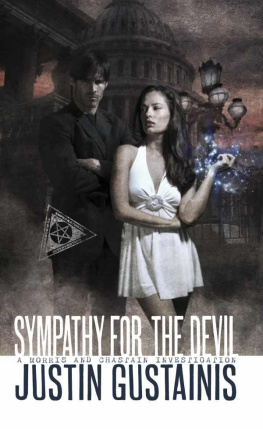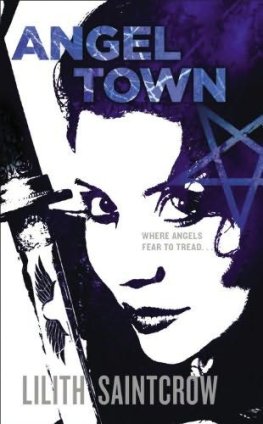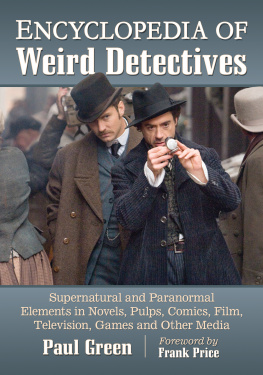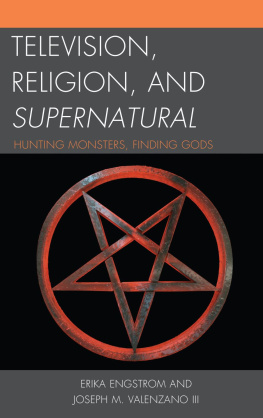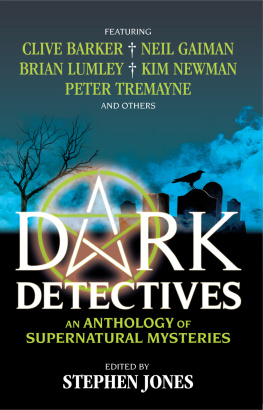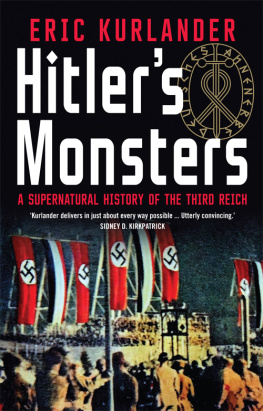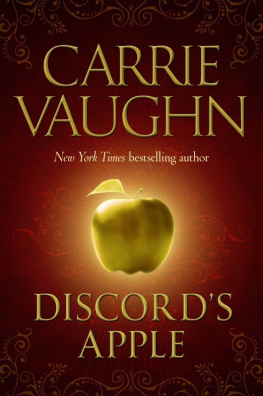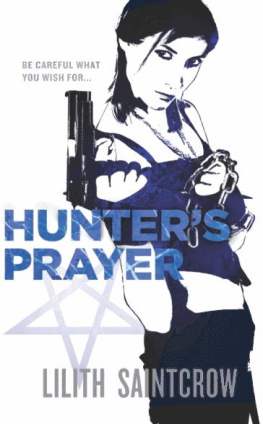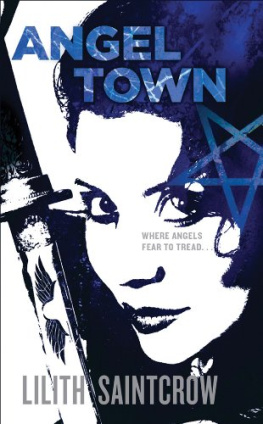Those Who Fight Monsters
Tales of Occult Detectives
Edited by Justin Gustainis
From ghoulies, and ghosties, and
long-leggedity beasties, and things
that go bump in the night, Good Lord
deliver us.
Old Scottish prayerThere are things that go bump in the night And we are the ones who bump back.
Professor Trevor BruttenholmIntroduction: Down These Mean Crypts a (Wo)Man Must Walk
by Justin Gustainis
As the subtitle tells you, this book is devoted to stories of occult detectives, a term that I define fairly broadly to include any fictional character who contends regularly with the supernatural. Thus, although not all occult detectives are monster fighters, all monster fighters are clearly occult detectives.
We decided to go with the present main title because Those Who Detect the Occult just didnt have the same zing to it.
The character of the occult detective has been part of our popular culture for more than a century. The most comprehensive listing of supernatural sleuths can be found at G. W. Thomas Ghostbreakers website (occultdetective.tripod.com/all.htm), although it needs updating. Thomas lists 164 occult detective characters in books, films, comics and television appearing between the mid-Nineteenth Century and 1999.
From the beginning, (probably J. Sheridan Le Fanus Martin Hessilius, in 1872), the occult detective often wasnt a detective, that is. He was often a doctor, sometimes a scientist, occasionally (as in the person of Abraham Van Helsing) both.
In modern fiction, the occult detective may be, among other things, a private eye, a police officer (in a universe that recognizes the supernatural), a reporter, a bounty hunter, a priest, a wizard/witch for hire, an antiquarian, an assassin even a waitress.
As this collection shows, the contemporary occult detective takes many forms, and may be male (John Taylor) or female (Jill Kismet), human (Pete Caldicott) or nonhuman (Dan Hendrickson), professional (Marla Mason) or amateur (Kate Connor), a saint (Piers Knight, sort of) or a sinner (Jezebel), gay (Tony Foster) or straight (Quincey Morris), cop (Jessi Hardin) or criminal (Tony Giodone). But each shares at least two traits with the others: specialized knowledge, and the courage to use it. Thus, they have more in common with the hard-boiled private eye than the classical sleuth. The occult detective is closer to Philip Marlowe than Hercule Poirot, and today usually appears in stories that are more hard-boiled than cozy.
Classical detective stories were all about the puzzle, usually (if ungrammatically) expressed as who done it? Once the cerebral investigator solved the mystery, action was usually left up to the authorities (Inspector, arrest that man!).
But the private eye goes beyond mere deduction. He (or she) may investigate, certainly examining evidence, interviewing witnesses, consulting experts to interpret what has been uncovered. But, having put the pieces of the puzzle together to form a unified whole, the private eye does something about it. The title of Mickey Spillanes first Mike Hammer novel expresses this point clearly: I, the Jury. And although most fictional private eyes are not brutal vigilantes like Mike Hammer, they usually share his desire to act against the bad guys, once the latter have been uncovered; it is no coincidence that in The Big Sleep Philip Marlowe compares himself to a knight in dark armor.
This willingness to confront evil on its own terms is also characteristic of the occult detective, who knows that wooden stakes have other uses besides holding up tents, and wolfsbane is not just a pretty flower.
However, the occult detective is more than just a supernatural private eye. In fact, I would argue that he or she embodies some of the central roles found in any society.
The occult detective serves as a doctor, who brings specialized knowledge and skill to bear upon some affliction someone who can diagnose the illness, treat it effectively, and propose effective preventative measures for the future.
The occult detective takes the role of a shaman, who understands the supernatural world and those who dwell within it. The shaman serves as a communication channel between the two worlds and sometimes, even travels between them.
The occult detective is a hero, in the classical sense an extraordinary individual who, with strength, skill, and courage, protects the community from those who would do it harm.
Small wonder, then, that the contemporary occult detective has found a home within the fiction genre (or sub-genre) known as urban fantasy a term that usually refers to stories set in a world much like our own, but with the addition of a supernatural element.
Occult detectives predate the category urban fantasy, but then so does urban fantasy itself. The literature came first, the label sometime later. Applying the generally accepted definition, Stokers Dracula was urban fantasy at the time it was published. The story depicts the actual Victorian world its readers lived in with the interesting addition, however, of the undead.
The movie Ghostbusters (1984) also appeared before the common use of urban fantasy, but clearly falls within that category. The film takes place in a New York City much like the real one, except that ghosts and other supernatural creatures exist, posing varying degrees of danger to the populace from slimy annoyance to the potential End of the World as We Know It.
The films opening theme asks, Who you gonna call? And by the time the marshmallow man is toast, we all know the answer.
More than twenty-five years have passed since Venkman and the boys first strapped on their gear, but the essential question remains unchanged. Even in the 21st century, whenever demons walk the earth, werewolves prowl the countryside, or vampires ride the night winds in search of innocents blood
Who you gonna call?
In the pages that follow, courtesy of some of todays best writers of urban fantasy, you will find fourteen delightful, disturbing, and downright creepy answers to that question.
I hope you enjoy them.
J. G.
Little Better than a Beast: A Marla Mason Story
by T. A. Pratt
This is for you, Miss Mason. Granger, the idiot hereditary magician of Fludd Park, handed a crumpled envelope across her desk.
Marla took the envelope, which was smudged from Grangers mud-streaked hands, and hefted it. It was age-browned and soft, made of some heavy paper with a lot of cloth mixed into the fibers. And whats this?
Its been in our house underneath the trees, Granger said, smiling affably, face as broad and unsubtle as a snowplow blade. In the safe, with a note, that said, give to the chief sorcerer of Felport on such and such a date.
Marla frowned. There was nothing written on the envelope, and it was sealed with several blobby hunks of wax. She could make out the barest shape of an impression in the central blob, maybe some kind of bird, a hawk or a crow, as if a signet ring had been pressed into the wax when it was soft, a million years ago. This has been in your family, like for safekeeping? For how long?
Granger looked at the ceiling and hummed and drummed his blunt fingers on the desk, which was how you could tell he was thinking. Marla didnt have much use for nature magicians in general, and inbred nature magicians with an inviolate hereditary line of succession and a seat on her highest councils were even worse. A long time. As many springs as there are days in a year, maybe much more.
Three-hundred-sixty-five years or so, then? That would date this letter from the earliest days of Felports founding in the 17th century, back when it was nothing but a few settlers clinging to life. In those days Grangers great-great-great-great-whatever-grandfather was just the sorcerer in charge of keeping the town commons and farmland healthy and green, long before the village became a thriving shipping and industrial center, and even longer before its recent rusty decline, an economic slowdown Marla was doing her best to reverse in her capacity as chief sorcerer and protector of the city. None of the citys population of ordinaries, oblivious to the magic in their midst, would know the new biotech companies and urban renewal projects were Marlas doing, but that was okay; she wasnt in this job for the glory. She just loved her city, and wanted it to thrive.


